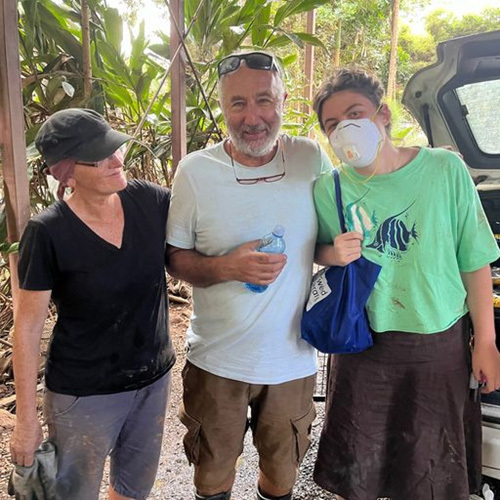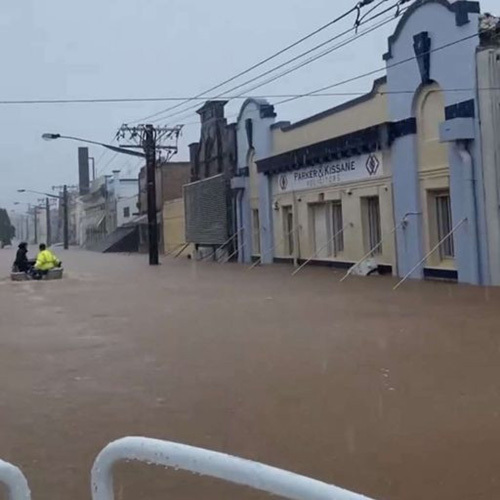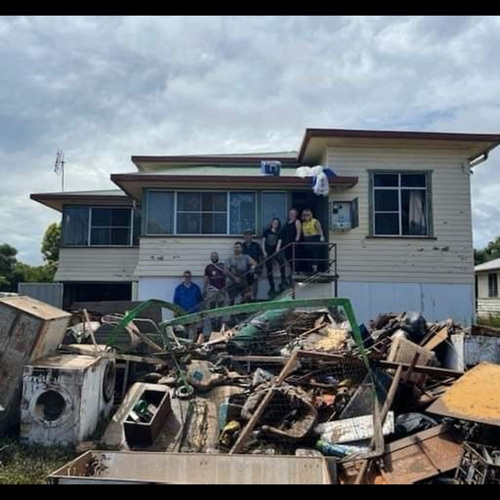- Autumn 2023
- Lismore floods – one year on

One year ago, Lismore and the Northern Rivers area were affected by the worst flooding in modern Australian history. Over three days in February 2022, flood waters increased to a maximum level of 14.4 metres. A further flood occurred in late March, and though that did not reach the heights of the earlier flood, it badly affected the area which was slowly trying to recover. What is remarkable however is the strength and resilience of the community, including the legal fraternity. Sophie Anderson (SA), the Bar Association’s representative for the North Coast, spoke with Kavita Balendra (KB) about what that period of the time was like.

KB: Could you tell us about yourself and how you wound up practising in Lismore?
SA: I started legal practice at the Aboriginal Legal Service (ALS) in Redfern. Then Blacktown. And then Western NSW as a solicitor with the Western Aboriginal Legal Service (WALS). One day I got a call from Lismore ALS saying that one of their longstanding solicitors was going on maternity leave and asked if I want to come over there for a little while. By that stage, I was very keen to see sand and blue skies. I came to Lismore for a period of six months initially, and then stayed. I was called to the Bar in 2013 and practise at Commercial Bank Chambers in Lismore.
KB: What is it like practising in the North Coast?
SA: I grew up in Sydney, but when I got offered a position in western NSW and moved, I enjoyed country life, the pace and also the practice of it. Once I came over to Lismore, I then fell in love with the North Coast. One benefit of being in the regional area is that you get a very broad spectrum of work. There are some very experienced barristers who have been practising in the region for their entire careers. There are a couple of established chambers here, Lismore Chambers and Commercial Bank Chambers. There are also a number of barristers scattered throughout the region. And particularly after COVID, the Bar almost doubled in number.
KB: How would you describe the collegiality up there?
SA: Everybody knows each other well and it’s an amazingly well-bonded set of barristers. Everyone up here is relaxed and generous with their time. It’s a very cohesive bunch of people.
KB: What does your role as the Bar representative of the North Coast involve?
SA: It’s a position to represent other barristers who practise up in the North Coast. If there are issues in various parts of the northern part of the state, my job is to be a bit of a conduit of the Bar. I check in with people, see if there is anything that the Bar can provide in terms of well-being and support, I assist with regional CPDs, judge’s dinners and official functions. I see my role more as a facilitator in terms of communication between the Bar and members of the Bar up here.
KB: Turning to 2022. I’m aware that the Regional Bar CPD occurred just prior to the floods. What was that like?
SA: That’s right. It was actually that weekend. The Regional Bar CPD was held on the Saturday. It occurs in Ballina/Byron Bay every year and is very well attended. Michael McHugh SC [then President of the Bar Association] and Andreas Hager [the Executive Director] came up to host it, along with Bali Kaur [Director, Professional Development] and Tiffany McDonald [Manager Learning Design and Development]. It had been raining heavily over the period leading up to the conference, so it was pretty wet already. Everybody knew that flooding was on the cards and the talk from locals was that there was definitely going to be a big flood. But nobody expected it to be an ‘over the 100-year’ flood. Nobody had thought that it would surpass both previous big flood events in ’74 and ’54.
On the CPD day, which was held at a venue on the river, we had all been watching the river drifting by getting browner and browner. And then on the Saturday evening into the Sunday it just hammered with rain, which continued throughout the Sunday and over that night. I remember I was listening to the rain on our tin roof, and thinking, ‘Wow this is like nothing I’ve ever heard’. On the Monday morning it was still torrential rain. There were alerts being sent out indicating that it was an extremely severe weather event with major flooding. Everything was basically on high alert and Lismore and surrounding areas were completely inundated. I remember spending the entire day on the phone with various people, particularly to try and reach out to members or other colleagues or get emergency services involved. It was so chaotic. The SES couldn’t cope with the calls that were coming through. I’ve heard that some of the police stations in the region were not even answering calls for help due to their own flooding issues. There were people calling 000 and not getting any response at all. Then, of course, people lost power and communication.
Over the following days, the Pacific Highway was also cut off to the North and South. There was no petrol coming in. There was no food coming into the region either. Of course, in the worst hit areas like Lismore, Ballina, and right up the Tweed Coast to the border, people had lost food and had no refrigeration and no electricity.
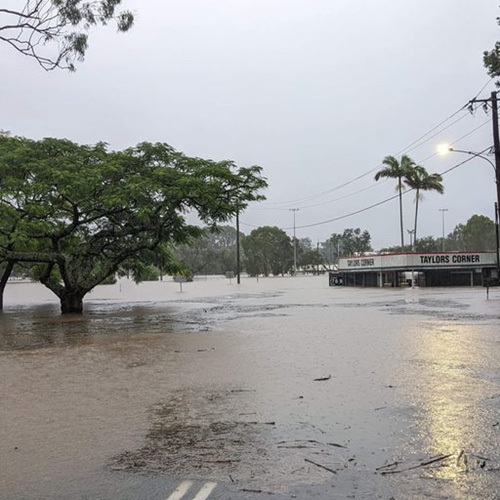
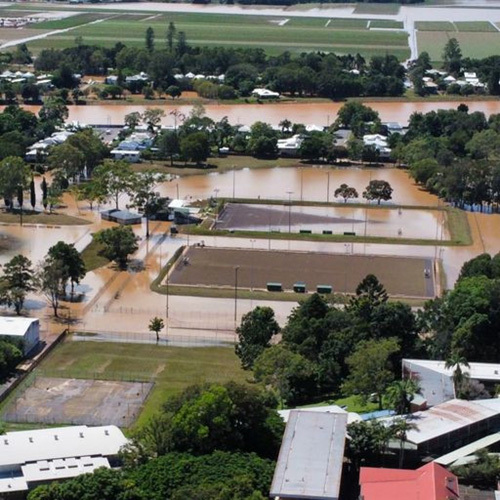
KB: I am aware that the legal fraternity really provided a great deal of assistance. What were people doing?
SA: I think anyone who could went to help anyone who needed it. I found out about a colleague who had lost everything and got to his place on the Tuesday or Wednesday morning. It was catastrophic. There was literally nothing left. It was all really terrible. When I got there the judge and judge’s associate had been there to see if they could help. That was what many people in the legal fraternity were doing, going house to house to see if they could help. I think everyone was just doing whatever they could to kind of contribute.
I think one of the useful things about lawyers is that we are (usually) very logical and organised. Some of my colleagues at Commercial Bank Chambers helped set up recovery centres immediately. One of those was Peace Decle. She coordinated with a number of people to start up a recovery centre at the University here, SCU, to deal with the thousands of people who had lost everything and had nowhere to go. She and Ben Cochrane, who is another barrister here, were trying to set up some system of attempting to care for people, including assistance with health services. I heard from others that the hospital was in complete chaos as none of the doctors could get into the hospital and they had staff shortages.
Basically, my colleagues met affected people, took their names and their addresses and what kind of identification they still had on them. Most people had evacuated in the middle of the night, so people had no forms of identification, and my colleagues tried to systemise what was happening until the government sent people in to assist. I know, in addition to people from the Bar, that there were a lot of solicitors from the DPP, Legal Aid, and many practitioners who went and worked in these temporary accommodation places around the clock in those first few days and in the weeks that followed. I know that in the beginning just after the flooding, people barely slept in that time because they were trying to field logistic issues about what actually needed to happen in terms of safety and support. So, it was a really mammoth task.
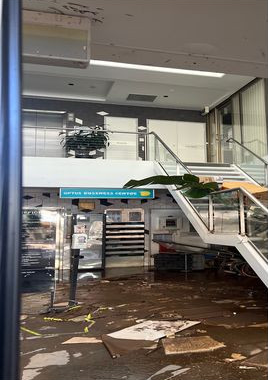
KB: Did you have contact with the Bar Association?
SA: Yes, they were amazing. The Bar Association reached out very early on the Monday. Michael McHugh had already spoken to people in Government by, I think, about 10:30 that morning. He was in contact a lot, offering support and reinforcing the availability of BarCare. Importantly they also made available funds from the Barristers Benevolent Fund, and it was made available immediately too. The Bar offered to do whatever they could as quickly and efficiently as they could to get people resourced, which I thought was incredible.
Some of the practical support they gave was to communicate to other courts and the profession that affected barristers weren’t going to be able to get to whatever court they needed to get to. I know they also reached out to the Law Society because we work with so many solicitors. I believe the Bar was also speaking to the Chief Magistrate and Chief Judge in the District Court on our behalf. Without Federal Circuit and Family Court mafter the floods Outside Tweed Heads Court people necessarily being here on the ground, others working in the profession might not have appreciated how much infrastructure was affected.
I know that the Bar provided information through InBrief so that other members of the profession, were made aware of the situation here. In the following days and weeks, I noticed in InBrief that other counsel from Sydney had set up charity drives for people in the Lismore region. I remember thinking at the time what a generous spirit that was.
KB: Going back to the first few weeks, how were people getting things back together?
SA: Once the water subsided, which took days, it was slow and was an enormous task. In Lismore, there was debris and detritus everywhere you looked. I remember going to this house in North Lismore and there was another entire house akimbo in their backyard, that had floated from somewhere, but no one knew where. Whoever owned this beautiful, old weatherboard ‘extra’ house, had been ripped out of the roof as there was a huge hole cut in the tin.
People in the region also lost extraordinary amounts of livestock and property. There were dead animals everywhere. You would drive into town and see a dead dog stuck in the top of a tree for example. Small planes came to rest in the tops of trees, from the airport. Couches lodged in trees, washing machines hanging from the power lines. It was extraordinary.
KB: What effect did the floods have on people’s practices and matters in court?
SA: With matters in court, everything just got adjourned. The court in Lismore was flooded in the downstairs area, along with other courts in the region, including the Federal Circuit and Family Court. The Lismore District Court moved to Grafton for a period of time. At least custody matters could be heard, and people could appear by AVL or could travel to Grafton to appear. Our chambers missed out of being flooded upstairs. We didn’t have electricity for weeks on end, however when we could, we opened up our chambers to all the firms in Lismore because we were lucky enough to still have an actual space that people could use. Other chambers, including Lismore Chambers were completely flooded and inundated unfortunately. They lost everything. As did many other solicitors’ firms in Lismore.
For solicitors, I know from speaking to many in Lismore, that among many issues, a big problem was the process of disposing of confidential documents that were soaked and destroyed. There was no electricity to shred documents, and you couldn’t shred because they were wet anyway. These firms lost literally everything. If there is anything I would suggest as a result of this event, it is that the Bar might try and formulate disaster planning for what to do for any catastrophe. I know that additional encumbrance on people’s already devastated practices took a heavy toll on some of the practitioners.
KB: So how are things going now?
SA: Lismore is still in recovery mode and it’s still desperately sad. The level of damage is hard to describe, and some people lost everything and are still displaced. Our building is still under renovation. I’ll be on the phone in chambers and all you can hear is the background noise of something being demolished.
But I think Lismore is an incredibly resilient town and the community really pulled together in every single which-way. I also think we’ve been able to fall back on the collegiate nature of our profession and get things back to normal as much as possible. In regional areas, those relationships are even more bonded by experiences like this. You just have that really close set of relationships with people, which is a true benefit of living and working in a small regional area. I think the kind of work that all of us do is stressful at the best of times; if you add a catastrophe to that it kind of takes things next level! But I think if you’re in a disaster situation and you know you have people that you can rely on, or even that you can provide support to people yourself, whatever it may be – it helps so much to be in a community that really cares. BN
